Strictly Confidential
Series “K”.
SPECIAL REPORT
ON WOMENS’ CONDITION IN INDUSTRY (INDUSTRIAL ENTERPRISES OF DNIPROPETROVSK REGION) AND MALE FACTORY WORKERS’ TREATMENT.
In order to analyze female workers’ moods, we studied the industrial enterprises of Dnipropetrovsk Region staffed with compact masses of female workers. In some workshops, the number of female workers accounts for 100-150.
As it comes from the materials under consideration, since female factory workers are increasingly promoted to better jobs nowadays, this work being intensified in this direction, some groups of male factory workers have been speaking negatively about women promotions recently.
At some enterprises, there are attempts not to let women be promoted to high-rank positions and to discredit them as factory workers. Male factory workers try to prove women’s inaptitude for work. Accordingly, some backward male workers allege the incorrect policy carried out by the Communist Party. According to those men, great attention is paid to women, whereas men gained all the victories of the Great October Revolution and men will be bearing the whole burden of the forthcoming war, etc.
Some of female factory workers are also dissatisfied, being paid little attention. According to those women, they are promoted only at the time of campaigns dedicated to the International Women’s Day. Women say that the working conditions are very poor, etc. Some of them also complain that their work is too hard. All these complaints and dissatisfactions are sometimes very well-grounded. It is noteworthy that women’s work is poorly adjusted at some enterprises.
PETROVSKYI PLANT. 13/УП At the time of loading under Pile-Driver №4, a group of male workers were talking about women’s presence in the workshops and about their promotion. Worker HAMANETS said: “I will never agree to equal rights of men and women, because women do not serve in the Soviet Army. We, men, are risking our lives and cannot admit that women are equal with us”.
Agreeing with HAMANETS, Worker PONOMARENKO, a Communist Party member, added: “Actually, women spoil our lives. For the recent years, I’ve heard at every corner that a certain woman walked by a certain man. Women in the workshops are in no way different from women out of the workshops. A lot of attention is paid to them”. The aforementioned HAMANETS touched upon the problem of women promotion, saying: “Almost every woman working in the workshop works in order to earn extra money for the family, whereas the other family member already provides for that family. Nevertheless, women are promoted in the first turn. It’s outrageous”.
There are about 40 women working in the turnery. Most of them are 2d-grade workers doing a bad and harmful job of washing glasses. Women are almost never promoted to better jobs in that workshop. For the period of the workshop’s existence (more than a year), only two girls were admitted to the machine tools. In November 1928, the shop foreman ANUSHKIN and the shift foreman FOMIN took on girls from the in-training workshop who had not yet finished learning. They got the rejecters’ jobs and were promised 4th-grade jobs, which was actually done. But it took those girls quite a short while to work like that. Due to a job cut, they were transferred to other jobs and were paid appreciably less. Currently, the girls are permanently shifted from job to job. Thus, the worker Fenia CHORNAYA, for example, was shifted to the brigade of metalworkers first. Then she was shifted to the tool room. Then she was shifted to the brigade of cutters. Now there is a proposal to dismiss her and to admit the male worker TATARKIN instead of her. She said she had already complained but had not achieved anything. The same occurs to other female trainees of the in-training workshop. In fact, those girls are dissatisfied, saying that their opinions are not taken into consideration and that no one tries to give them qualifications, shifting them from job to job. Being very dissatisfied, the girls blame the trade union committee and the local Communist Party outlet, saying that they don’t give them any appropriate reassurance or support.
26/УП Coming up to the women working on the dirt fill near the office of the pile-driver shop, the labor safety committee began asking them questions: what are their working conditions, what is the attitude of the related agencies towards them, etc. In total, there were 15 women working on the site. Almost all of them complained that their wage class was too low, that their work was too hard, taking them a long time and that the slug had to be carried in the stretcher to a very faraway place, about 73 meters away. One of them said that on that very day two women were inside a railroad truck and two more were going upstairs, lifting the stretcher full of slug into the truck. At that time, the steam locomotive moved the trucks and the women fell down and were not injured just by chance. In the course of the conversation, those women said that the society work was poorly adjusted, that they didn’t attend the meetings and that they were not knowledgeable enough of the current events, etc.
3/УШ In talking to a group of women working in the blast furnace shop, SKIDINA, a woman working in the same shop, said: “Women are very much spoken about. But in fact, we can’t see anything good at our plants. Nine women working in the blast furnace shop were supposed to be offered jobs with co-cooperative stores, children’s homes and kindergartens. But none of them knew anything about that initiative, because the related paper was swept under the carpet somewhere in the regional administration or in our manager’s office. Despite there are a lot of women doing extremely hard jobs, no one really cares about them. There are women who have been working as water carriers for 7 years. Women are offered better jobs only on the eve of Women’s Day”. Some of those present said that Delegate SALONINA pays little attention to women’s work, that the trade union committee stake on men who are good speakers and that only those men are promoted and offered better jobs.
In response to the question about better job offers, Maria KHARCHENKO, a woman working in the transportation shop, said: “I’ve been working at the plant already for 7 years, carrying a stretcher. There are lots of jobs occupied by ex-bourgeois and their wives. Ordinary women are never offered those jobs”. Another female worker told me about an incident that occurred in the same shop. On occasion of Women’s Day, SCHERBINA, a female worker, was promoted to the position of engine driver’s mate at the steam locomotive depot. Men working as engine drivers and engine driver’s mates rejected her and insisted that she should be taken away from the depot. SCHERBINA wanted to get a job with the depot and was doing her best to meet her target. She used to turn to the trade union committee, to the regional Communist Party committee and to other agencies but failed to achieve positive results. POPOZ, the depot’s supervisor, saw eye to eye with the aforementioned male workers, presenting reasons why SCHERBINA could not become an engine driver’s mate.
Women’s work is better adjusted in the rolling shop. Women are promoted to a number of positions and qualifications. Women occupy the following positions: weighers in the shaped iron warehouse, weighers on coal and iron wires, engine drivers on Prime Drive №9 and on the power crane in the shaped iron warehouse, engine drivers on all the gantry cranes on all the prime drives of the shop as well as on the marking site for iron sheets, etc. However, some groups of men working in the shop say that women are not very familiar with the machines they work on and that the machine stops without proper maintenance. In talking to a group of workers, Hrihorii KIZICHENKO, a male worker aged 35, said; “Coming to work, experienced male engine drivers examine every screw and every nut before getting down to work, whereas female engine drivers don’t do it. They work until the stoppage occurs, i.e. until the machine becomes a cripple. Therefore, the cranes have been stopping very often of late in our rolling shop”.
Women are almost never offered better jobs on the water engine of the power shop. Once CHERNIKOVA, a woman working in the shop, was promoted to the position of engine driver on new pumps where 3 men worked alongside her. Despite she was doing the same job with the men, she was paid 37 rubles, whereas the men were paid 92-100 rubles. The bonus pays were calculated by MOSHKOV, the power shop’s supervisor. When she asked him about the wage, she was told that she worked as a day laborer. But after a long ordeal, they paid her 21 rubles more.
LENIN PLANT. LOKSHINA, a woman working in the workshop in Manismanivska St., was promoted to the position of engine driver. In talking to a group of workers about it, Anton BURACHEVSKYI, an oiler, said: “It’s outrageous that women are promoted to high-level jobs and paid 100-120 rubles, whereas men must work as ordinary laborers”. Some of the male workers present there began supporting him but one of them said: “You are wrong, guys. Women must also be given a path to follow, because they will succeed us at the plant in case of war”.
16/УП In talking to 8 men working in the warehouse of metal billets of the sheet-rolling shop, Boris MOROZ, aged 43, a Communist Party member expelled from the party because of being involved in the opposition, said: “Why should the plant keep those women? Why not just pay her because she is going to have a baby? The production will not benefit from her anyway”. The workers who were present did not say anything.
22/УП A group of electricians working in the power supply shop was talking about the condition of women in industry. DANILEVSKYI, an electrician and ex-peasant, said: “It’s no use keeping women at the plant. The situation was better when they were kept away from production and when they were not occupying high-level positions. Nowadays we have family dramas everywhere, because women have begun putting on airs”. REVIN, another electrician, said: “I don’t mind women working here but they are very well promoted. They take on illiterate women and appoint them high-level positions. Then those women discredit us, because first we have promoted them, then local party outlets approve their promotion, being suppressed from above”.
DZERZHYNSKYI PLANT. 13/УП In the brick-producing shop, the drying site and the milling site were spilled with water. There was 8-centimeter deep water. That occurred while Malvina YURGEHS, a woman taskmaster, was on duty. Water filled the rolls, the drying furnace and the elevators. The water was breaking through the wall to the shut-off pit where there are motors. In the morning, the metalworkers who came to work blocked the hole with clay and cleared the passage near the main diversion ditch. As a result, water came off within 10 minutes. Near the water retainer of the main ditch, water had washed off the ground at night and for nobody to fall down there, a worker had covered it with iron. That iron had become the stopper for the water flow-out. After 6 o’clock, YEROSHKIN, a taskmaster, came to work. In talking to STEPANTS, another taskmaster, and KOLOMEITS, a metalworker, YEROSHKIN said: “It is the newly promoted YURGEHS who is to blame here. Why didn’t she block the doors on the site or have the workers sleeping in the lounge clear the ditch?” HOLBRAISHCHT, the shop’s foreman, came at 7 a.m. and called the fire brigade who pumped the water off the pits. The following day, 15/УП HOLBRAISHCHT filed a complaint of YURGEHS with the trade union committee and with the plant’s administration claiming that she should be fired. KOLOMEITS answered: “What’s YURGEHS got to do with it? Being a newly promoted taskmaster, she doesn’t seem to be well-informed or to know the location of the ditches. On the other hand, why didn’t the shop’s administration bother to turn up in the shop for the whole period of the rain?” Some of those present supported KOLOMEITS.
The job placement center sent KORSUNOVA, Communist Party member, secondary education, as a temporary bookkeeper to the accounts department of the railroad car shop. When she had already worked for about 3 days, IVANOV, the accounts manager, gave her an assignment. He built that assignment so that KORSUNOVA had to make a lot of calculations and use an adding machine in order to fulfill the assignment quickly. Since KORSUNOVA can’t operate the adding machine, she fulfilled the assignment in the arithmetical manner within an hour and 10 minutes. When KORSUNOVA turned in the fulfilled assignment to IVANOV, he told her: “If it takes you an hour to fulfill assignments of the sort, the accounts department will be faced by a complete demurrage”. KORSUNOVA was fired that very day despite she had coped with the bookkeeper’s work well enough and could have learnt to operate the adding machine within a short period.
KOMINTERN PLANT. KOVALIOVA worked as a shovel riveter’s apprentice in the spade and shovel shop. She had recently got back to work after a 4-months’ vacation for nursing mothers. Since it was necessary for her to get home for half an hour during the working day in order to feed her baby, the administration did not admit her to her previous workplace and had her do many other jobs. KOVALIOVA asked the administration to admit her to the rove-stamping press where she could work. But the administration and the trade union committee denied her for the same reason, which made women feel dissatisfied.
Maria CHARENKO, aged 19, a Soviet army servant’s wife, works in the spade and shovel shop. Her not being healthy enough, the doctor prescribed her an easier work. The administration admitted her to the rove-stamping press but Fiodor KASIK, a matrix metalworker and a Komsomol member, began pestering her, saying obscenities, and insisted that she should be removed from the rove-stamping process. Now CHARENKO does lots of other jobs. Some of the male workers are dissatisfied with KASIK’s deed.
Some women working at the former Communard Plant are dissatisfied with the way they are sent to health recreation houses. Sonia BERDICHEVSKAYA, a laborer, aged 35, said in private: “Pasiura, the women’s leader, distributes women’s accommodation in the health recreation house incorrectly. Instead of sending us, those working in production, she sends women working in the office in the first turn. Thus, she sent Krashkova there”.
Timofei PRIADKO, worker of the roasting shop, aged 50, not a Communist Party member, an ex-peasant and 4th-grade packer, said in private: “I mind women being promoted to high-level jobs and I mind teaching them, because it’s a waste of time. She would learn and then quit, because she is getting married. But if we teach men instead of women, men will be providing for their families and will get the qualification”.
Three women were appointed weighers in the power shop. Some male workers are dissatisfied, because women were promoted, not men. DEMOCHKIN, a worker, said: “Promotion of women is unjustifiable, because if men were promoted, they could be used at the hearth. Women are unfit for it. They want to carry out some policy with women and want nothing but hard work from us, men”. He was supported by the workers KUSHNARIOV, TIMOSHENKO AND LINEVICH.
LIEBKNECHT PLANT. Vera ARTIUKHOVA, a newly promoted female worker, a muff-cutter of the tube-trimming shop, Communist Party member and local government member, is dissatisfied by the administration, saying: “When I worked in the screw-cutting shop, I worked in the store room. Then I was removed from there and thrown to driving in nuts. Then I was thrown to muff-cutting to the tube-trimming shop where it took me 6 months to learn. Then I was transferred as an apprentice of the shop. Then they wanted to fire me but due to my tears and because I am the wife of the dead communard, I was admitted to the muffs again. To crown it all, I am being chased like a hare. M. Michkariova and O. Zaderiboroda were promoted to muff-cutting. Then the former was told to carry water around the shop; the latter was transferred to the screw-cutting shop to drive in nuts. Thus, they wasted the money they had spent on me: I had been learning for about 6 or 7 months. If I hadn’t been thrown to and fro, I would be already working well. Besides, they gave me the worst machine tool: work is maddening”.
MARX PLANT. There are about 80 women working at the plant. Some women have already been promoted to high-level office jobs but in being talked to, women say they are dissatisfied with the very promotion procedure. In speaking about promotion, KHREVKO, a weigher, not a Communist Party member, said: “Promotion is not about all the women. Women can be admitted for example to an excavator or promoted as weighers to the blast furnace shop. But the administration hinders all that, saying that a woman will not cope there”.
RENTS, another female worker, said that only those who know how to rise in the world are promoted. An ordinary worker cannot even think about promotion. According to RENTS, women promotion depends on the women’s leader. Since the women’s leader is always busy with other things, she doesn’t pay appropriate attention to women work. Therefore, women are dissatisfied.
PRESSTROY PLANT. The plant’s trade union committee promoted the worker BESHUNOVA to the position of a senior marker. A BONDAREV, aged 30, not a Communist Party member, was admitted from the job placement center as a junior marker. Thus, BONDAREV was supposed to take orders from BESHUNOVA. BONDAREV is dissatisfied with his appointment since he is forced to take orders from a woman and feels like quitting, saying: “I am afraid to lose my job but I had better be jobless and I had better suffer than take orders from a woman”. Knowing that BONDAREV is suffering because he has to take orders from her, BESHUNOVA is trying to improve his working conditions. But he persists that he can’t stay at work since he is not used to taking orders from a woman.
UKRAINLES. 26/УП At the sawmill, at the beginning of the working-day, a group of 28 stackers was talking about women promotion. KUNAIEV, a machine tool operator, local government member and native worker, not a Communist Party member, said: “I can’t understand how a woman can be promoted and a man can be made inferior. For example, I am a highly qualified machinist but I earn less than a woman does, working in jaw production”. He was supported by VOLFSON, not a Communist Party member and native worker, aged 53, who said: “A woman can never do as much as a man. The stacker’s job is very hard. He hauls logs like an ox but earns less”. Some workers agreed with those men.
DEPUTY HEAD OF POLITICAL HEAD OFFICE
OF UKRAINIAN SOVIET SOCIALIST REPUBLIC /CARLSON/
September 20th, 1929

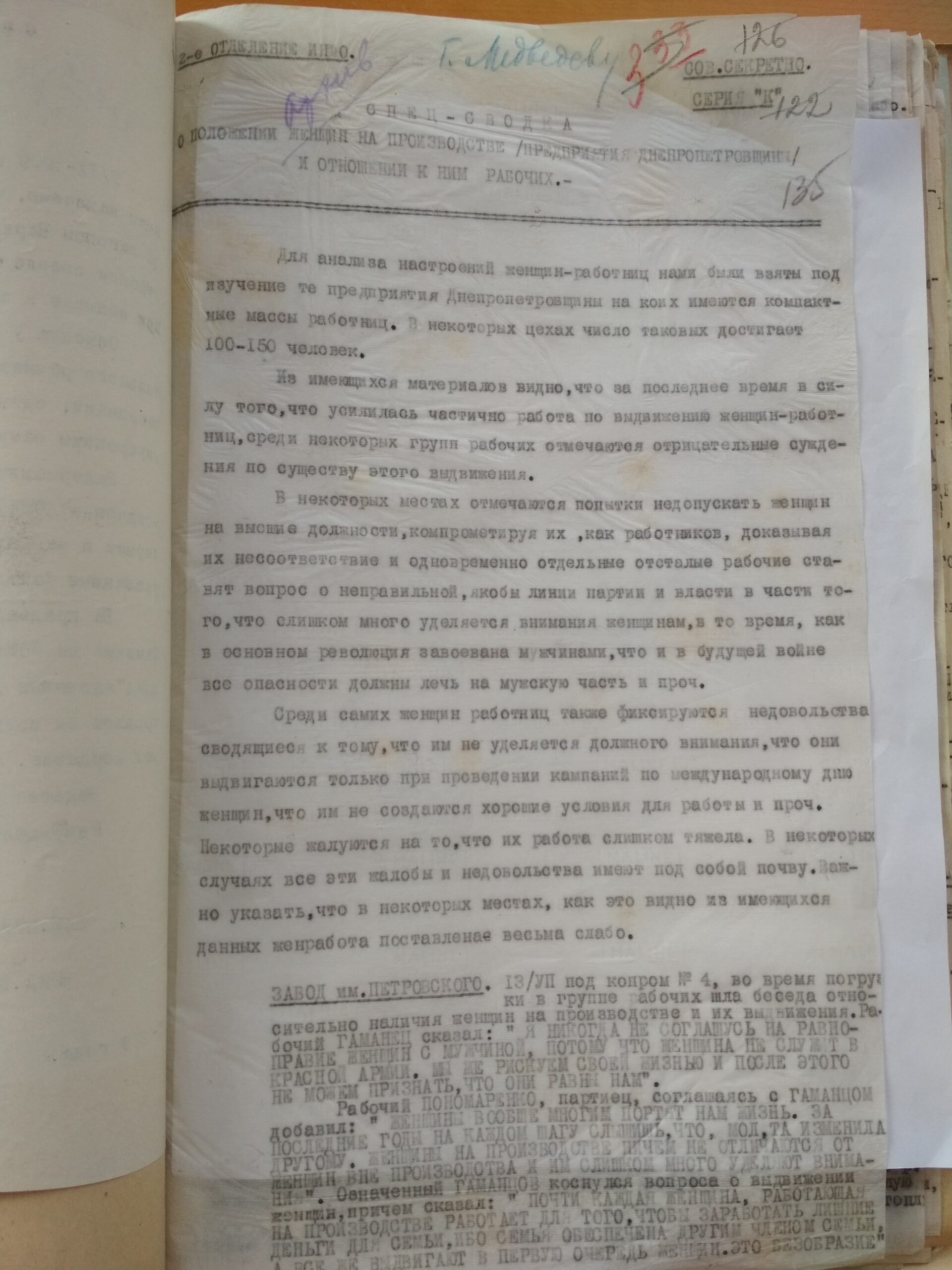
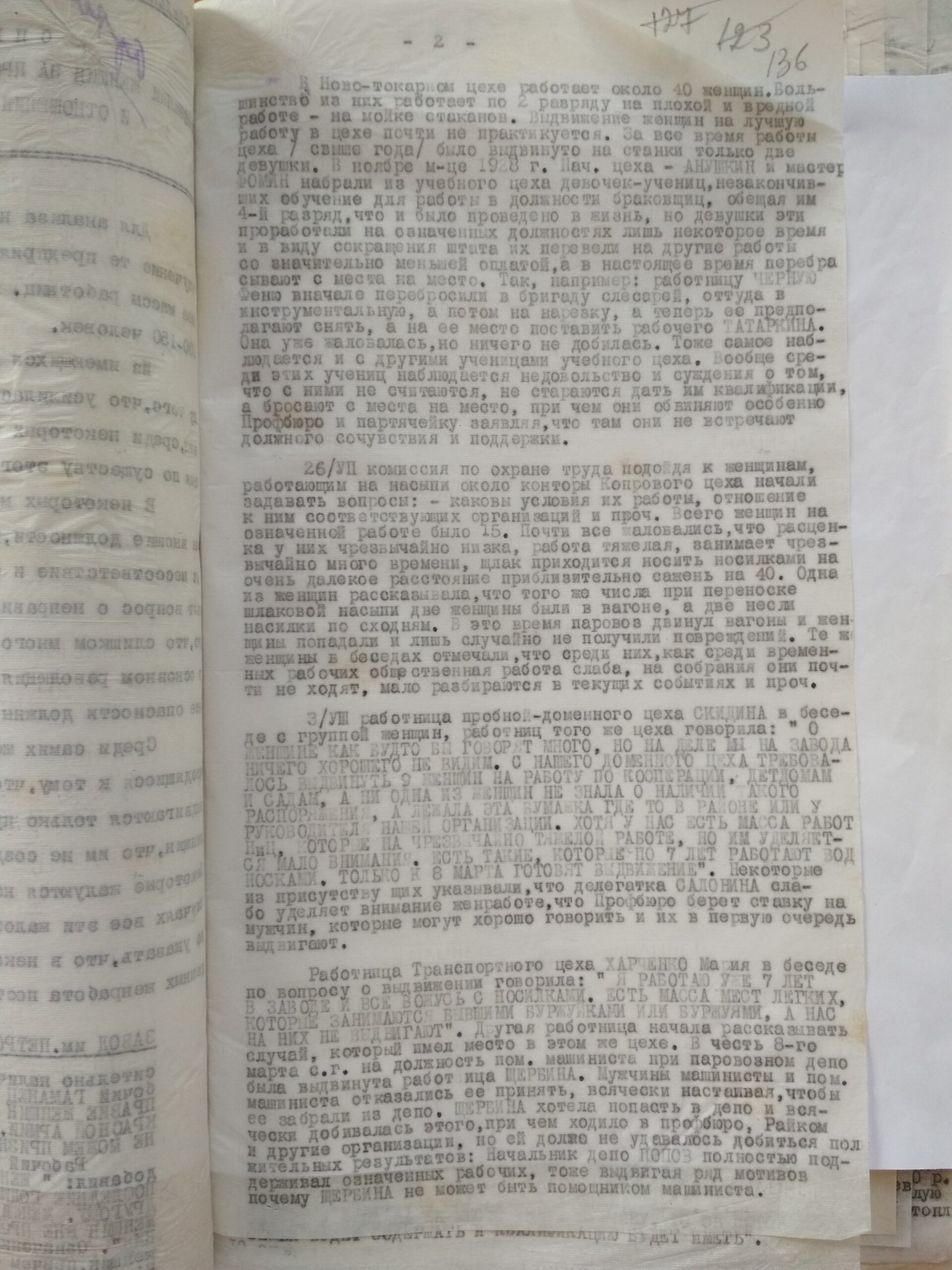
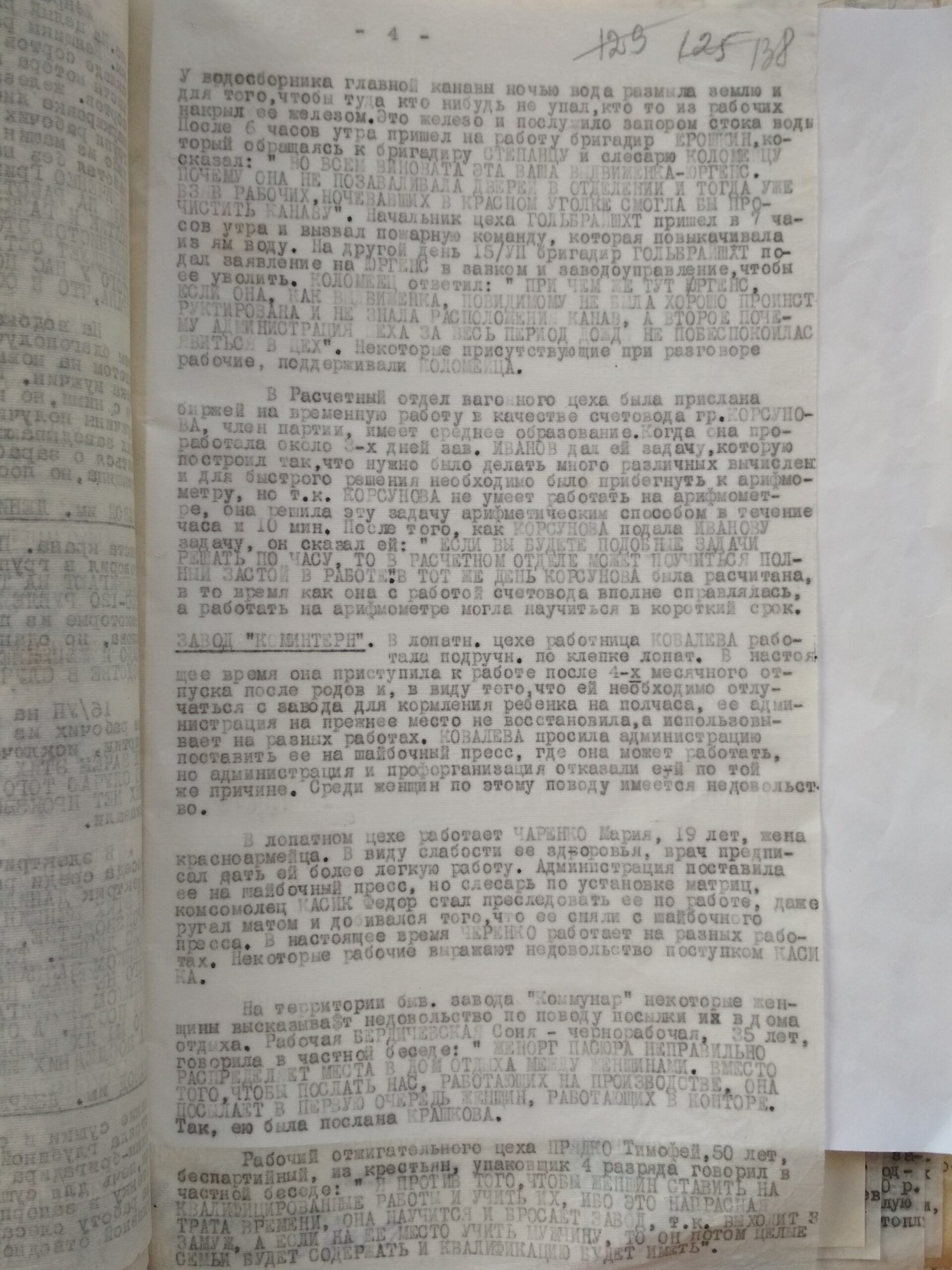
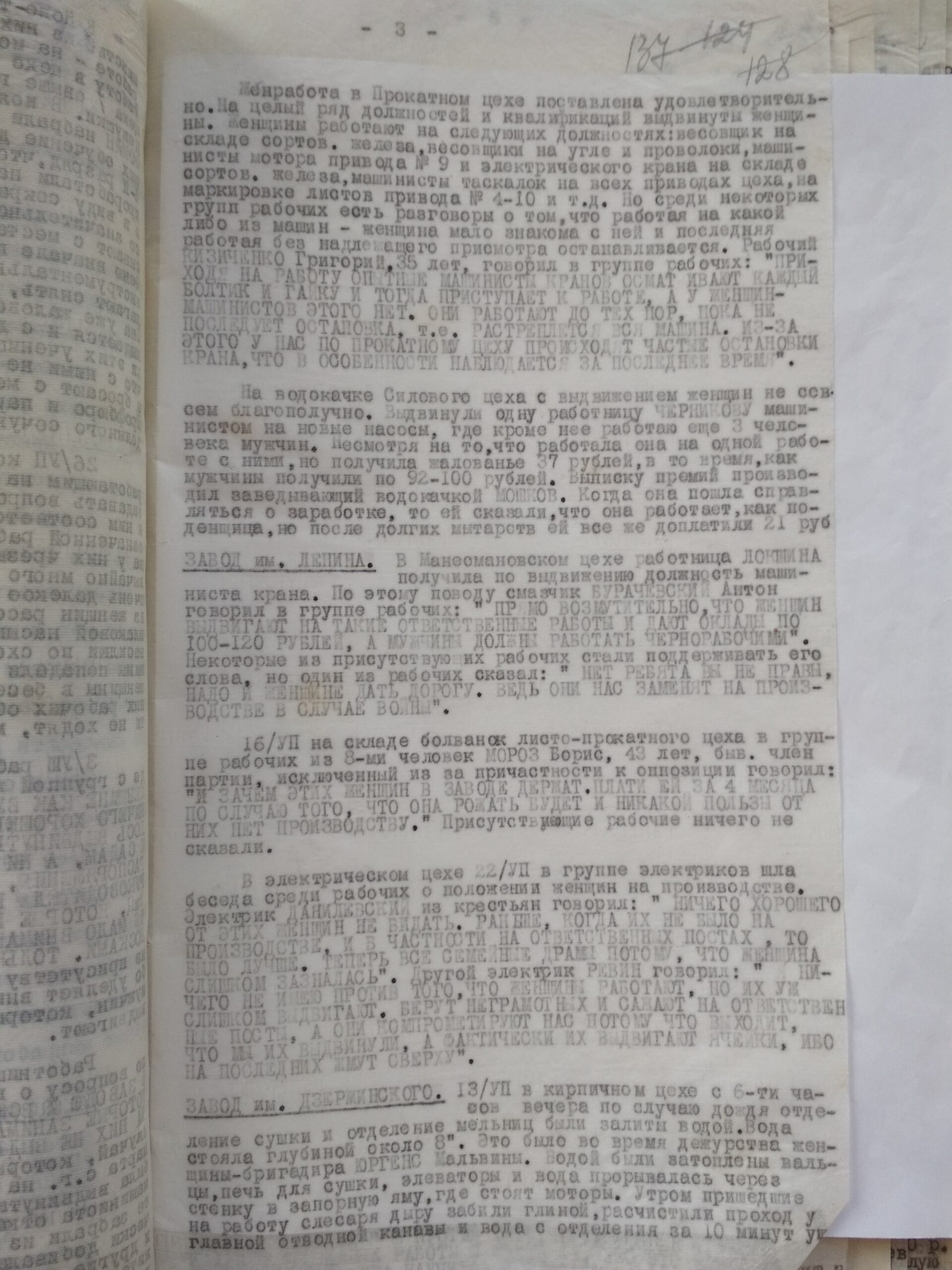
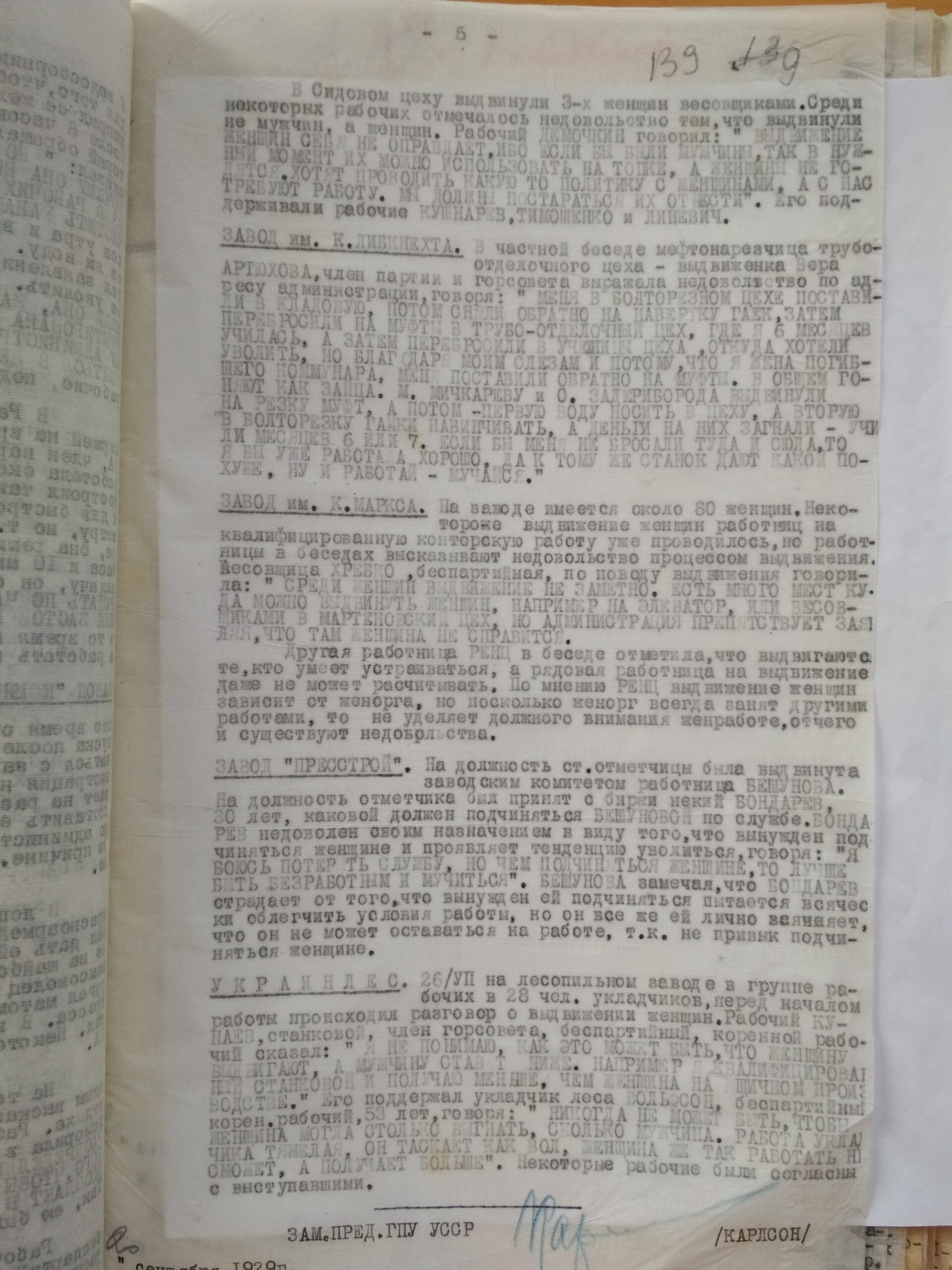
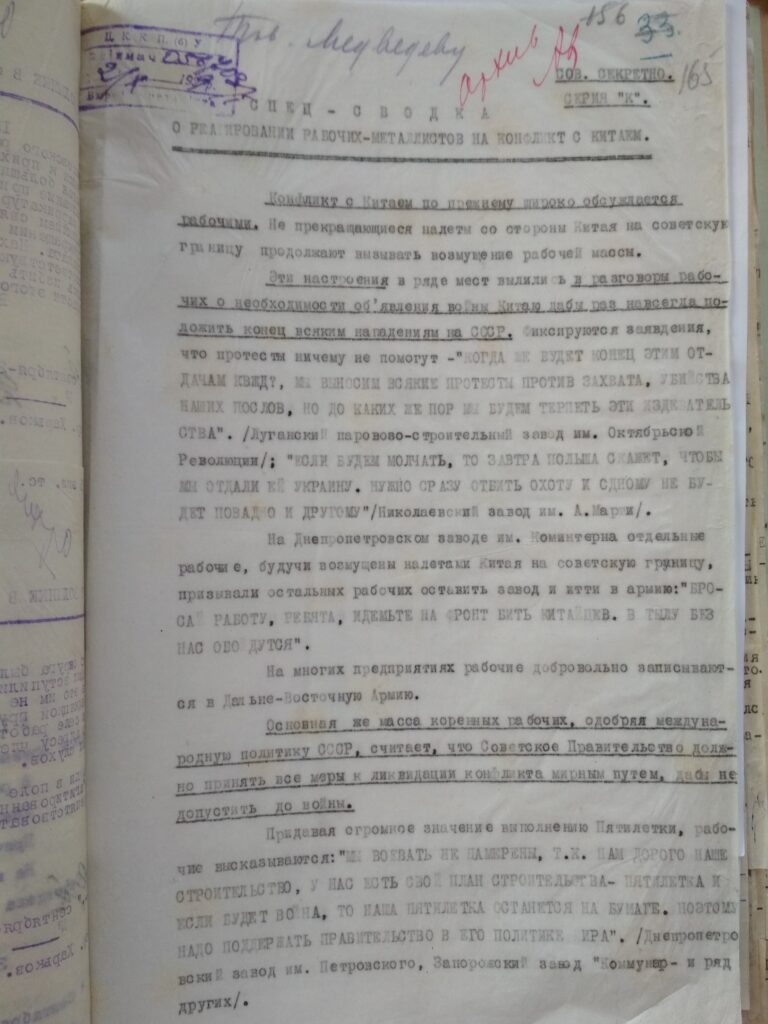
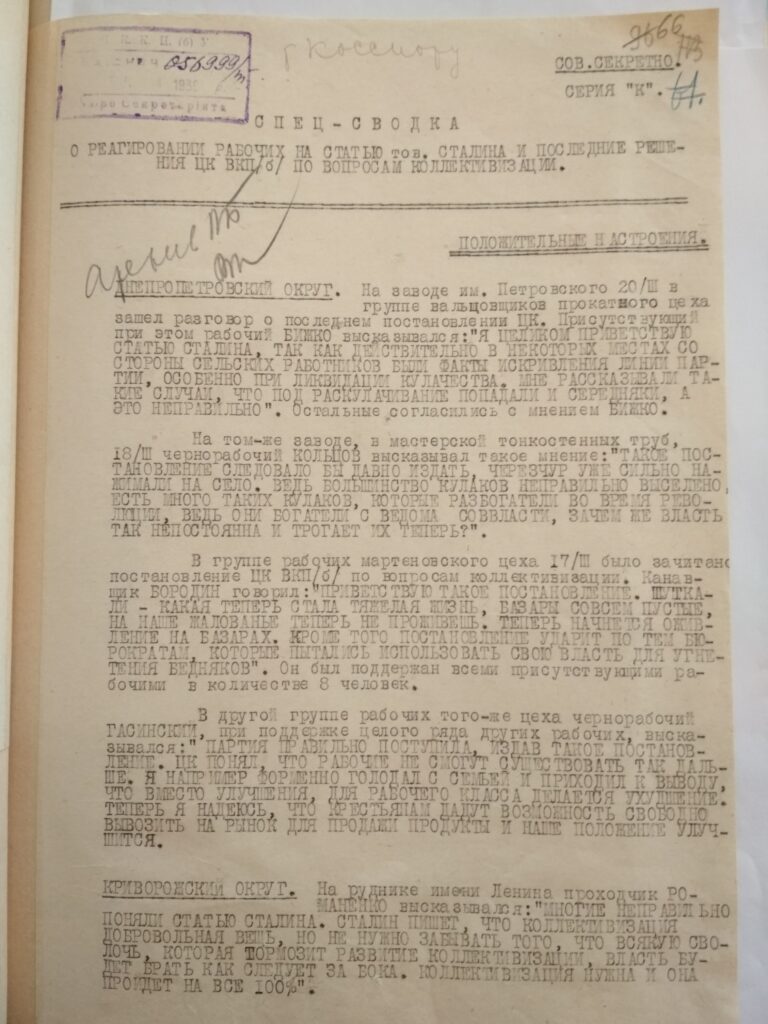
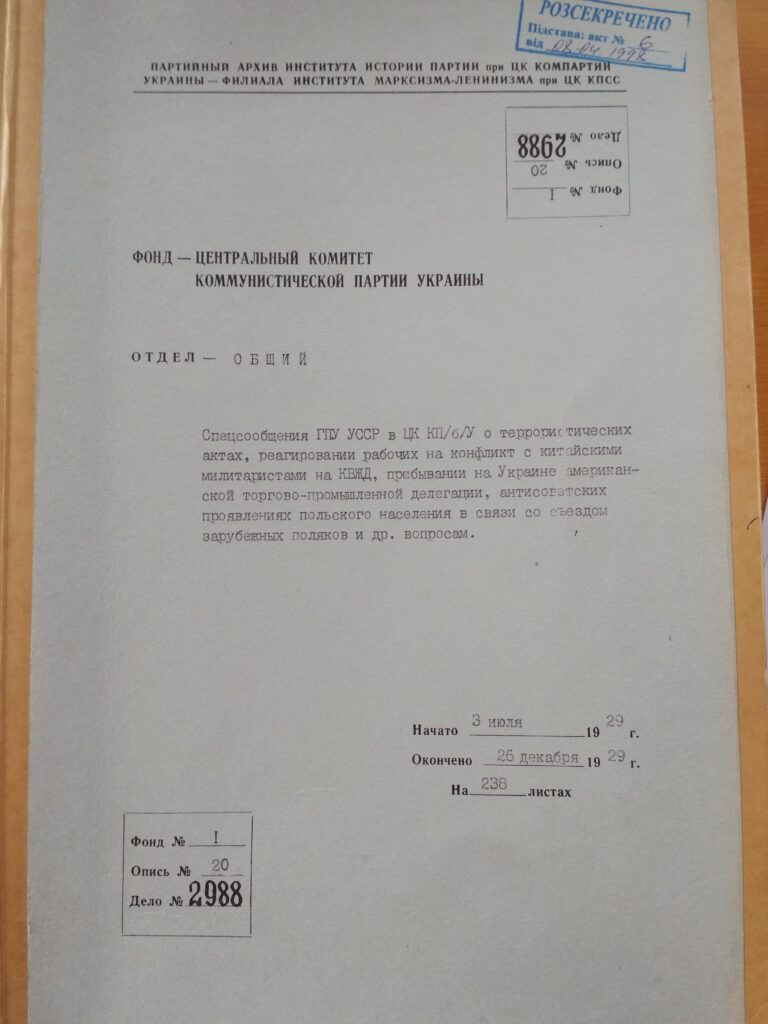
This document contains workers’ reflections on the Soviet policy of involving women in manufacturing. The authorities intentionally collected them [reports] in order to enable a more realistic assessment of the current domestic political situation. The study of such reports became possible after Ukraine gained independence, as they were all classified during the Soviet era. Analysis of this source will allow us to see the implementation of Soviet gender policy in industry on a daily basis. The text describes the problems that women faced at work: prejudiced attitudes of men, difficult working conditions, pay inequality, the declarative nature of changes in the status of Soviet women, etc. The document records men’s reactions to women’s involvement in the industry and their transfer to positions that were previously considered exclusively male. In their assessments, factory workers often accused women of incompetence and considered it wrong and offensive that a man should be subordinate to a woman.
The analysis of this document allows us to obtain detailed characteristics of workers’ everyday lives and see them as subjects of historical reality who reflect on and assess their situation. Such reports on attitudes are, therefore, an indispensable source for studying the history of Soviet society.